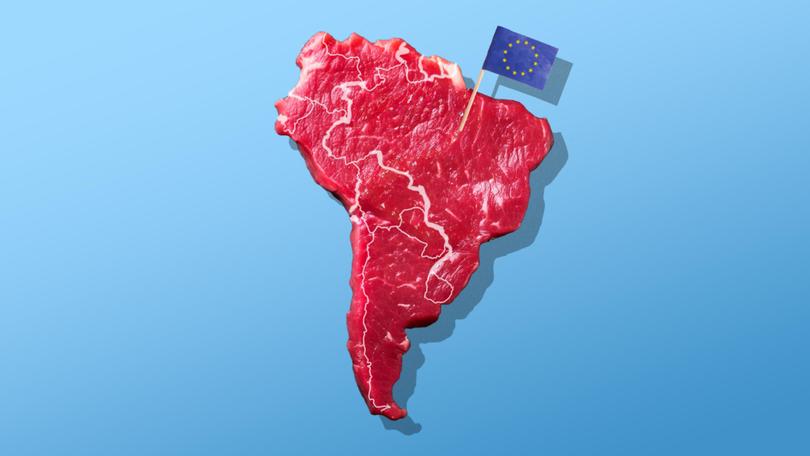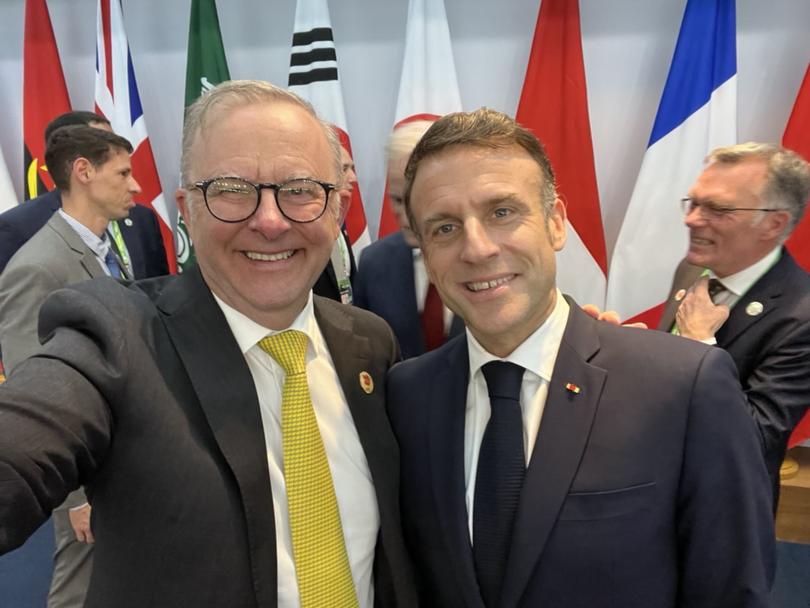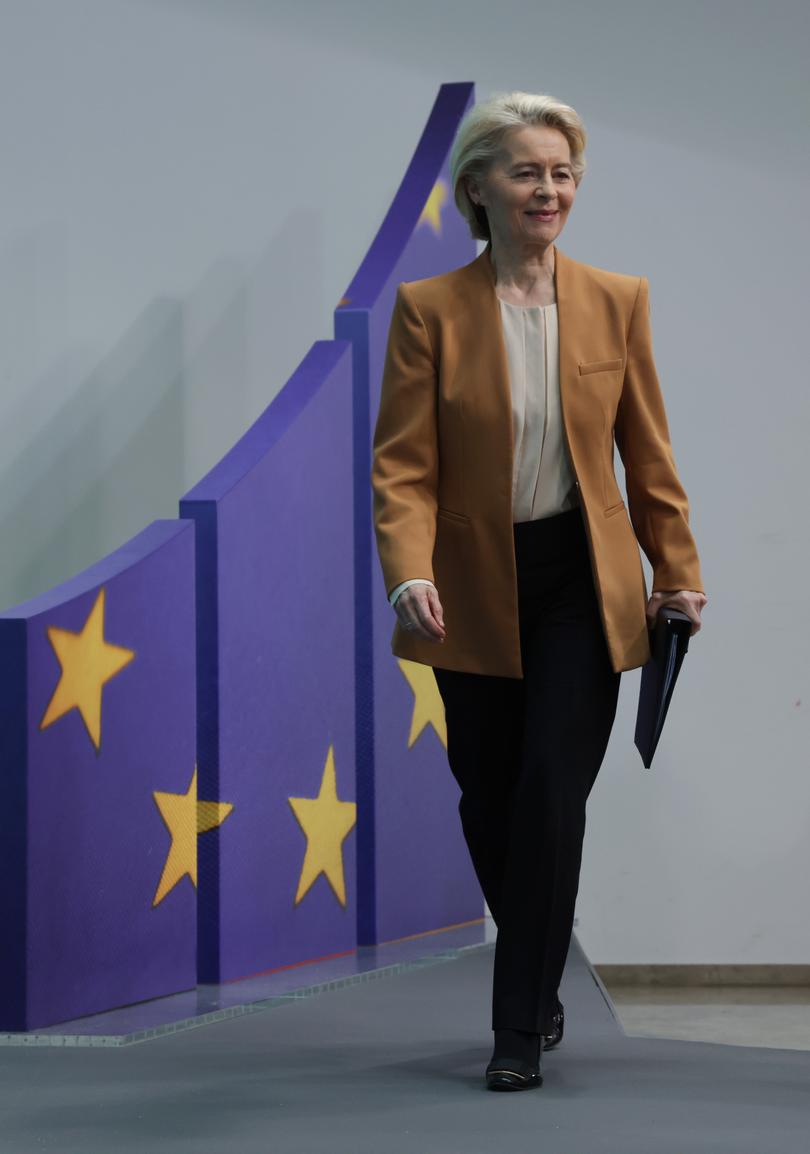LATIKA M BOURKE: Anthony Albanese complained ScoMo stalled trade deal, but the EU likes him no better
The EU has all but shelved its hopes of securing a trade deal with Australia and is instead focussed on clinching one with South American countries, and there is one person to blame.

The European Union has all but shelved its hopes of securing a trade deal with Australia and is instead focussed on clinching one with South American countries, possibly as early as December, it can be revealed.
Talks collapsed last year over a dispute about how much beef Australia would be allowed to export into the EU.
The backlash was led by French President Emmanuel Macron and backed by the Irish who feared their heavily subsidised farmers would be unable to compete with Australian imports.
Sign up to The Nightly's newsletters.
Get the first look at the digital newspaper, curated daily stories and breaking headlines delivered to your inbox.
By continuing you agree to our Terms and Privacy Policy.The negotiations fell apart over arguments involving several thousand tonnes of beef that could be exported to the EU without any tariffs.
This week the Czech Republic foreign minister Jan Lipavsky told The Nightly the Commission should divert even more subsidies to the special interests blocking the deal because of the urgent need for both sides to diversify their trading relationships and supply lines.
But The Nightly understands Australia is no longer a priority for President Ursula von der Leyen, who is set to formally begin her second term in the coming days.
When contacted for comment, EU trade and agriculture spokesman Olof Gill said there was no mention of Australia in the president’s mission letter to the incoming Trade Commissioner Marcos Sefcovic.
“There has been no particular mention of reviving the Australia deal in any of the overall political priorities for the new Commission, or in the specific mission letter of incoming Trade Commissioner Sefcovic,” Mr Gill said.
“But that doesn’t mean there couldn’t be movement, and at short notice, should Australia send the right political signals about returning to the negotiating table, having dropped the outlandish re-tabled demands that sank talks at the 11th hour last time around.
“In other words: the deal isn’t dead, it’s in a halfway house.
“But it’s up to Australia to make the first move, after they burned all the goodwill last time around.”
Last week Prime Minister Anthony Albanese and Ms von der Leyen met at the G20 summit in Rio, Brazil, but neither said they talked about reopening trade talks in their official statements after their meeting.

Just a minor reference was raised in their meeting.
Australian Institute of International Affairs CEO Bryce Wakefield said he was often told by European diplomats that the fault for the collapse of the talks lay with Australian and European agricultural interests.
“The difference is that Australia is looking for more mutual access, which would appear to be the point of a free trade agreement.”
“The Czech foreign minister Jan Lipavsky is right to state that trade is now geopolitical,” he said.
“But the EU will only be taken seriously on this once the French begin to tell their farmers that.”
Shortly after being elected PM, Mr Albanese blamed his predecessor’s climate and AUKUS policies for failing to get a breakthrough.
But with this Government faring no better despite vaunting its efforts to repair the relationship with France, the EU has its sights set on negotiating a trade deal with the huge South American Mercosur bloc of countries comprising Argentina, Brazil, Paraguay, Uruguay and newcomer Bolivia, that has been discussed for a quarter-of-a-century.
There is growing confidence on the EU side of a breakthrough very soon.
That deal is also opposed by France even though Europe already hands out enormous subsidies to farmers, with one-third of the EU’s budget diverted to supplementing farmers’ income support through the Common Agricultural Policy.
Farmers are again protesting in France as well as in Poland over Mercosur following the spate of farmer protests across the continent earlier this year that have caused political headaches for European leaders at home, including President Macron whose party took a massive beating and lost its majority in a snap election he called earlier this year.
While Macron’s power is weakened within Europe, President von der Leyen’s is strengthened, with the mother-of-seven becoming one of the few COVID-era leaders to successfully seek re-election.
She is now trying to get Mercusor over the line rather than Australia because it is a larger trading bloc and will also give the EU access to critical minerals which it wants to help diversify its transition to net zero away from Chinese batteries and green technology.
Europe also hopes to woo Latin America away from Chinese investment as part of its wider push to win over countries that are not traditionally aligned with the West.
“If we don’t do a trade agreement with (Mercosur), then this void will be filled really by China,” said Kaja Kallas, who is set to be the EU’s next top diplomat.

A vote to approve her new commission will be held on Wednesday and if approved her new team, including a new trade negotiator, will start work on December 1.
If Ms von der Leyen were to secure an agreement with the South American bloc, it would create one of the world’s largest free trade zones representing about one-fifth of the global economy.

